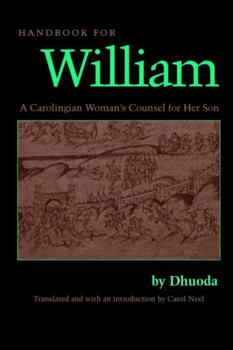Handbook for William: A Carolingian Woman's Counsel for Her Son (Medieval Texts in Translation)
Select Format
Select Condition 
Book Overview
"I send you this little book written down in my name, that you may read it for your education, as a kind of mirror." So wrote the Frankish noblewoman Dhuoda to her young son William in the middle of the ninth century. Intended as a guide to right conduct, the book was to be shared in time with William's younger brother. Dhuoda's situation was poignant. Her husband, Bernard, the count of Septimania, was away and she was separated from her children. William was by Charles the Bald as a guarantee of his father's loyalty, and the younger son's whereabouts were unknown. As war raged in the crumbling Carolingian Empire, the grieving mother, fearing for the spiritual and physical welfare of her absent sons, began in 841 to write her loving counsel in a handbook. Two years later she sent it to William. Handbook for William memorably expresses Dhuoda's maternal feelings, religious fervor, and learning. In teaching her children how they might flourish in God's eyes, as well as humanity's, Dhuoda reveals the authority of Carolingian women in aristocratic households. She dwells on family relations, social order, the connection between religious and military responsibility, and, always, the central place of Christian devotion in a noble life. One of the few surviving texts written by a woman in the Middle Ages, Dhuoda's Liber manualis was available in only two faulty Latin manuscripts until a third, superior one was discovered in the 1950s. This English translation is based on the 1975 critical edition and French translation by Pierre Rich . Now available for the first time in paperback, it includes an afterword written by Carol Neel that takes into account recent scholarship and the 1991 revised edition of Rich 's text.
Format:Paperback
Language:English
ISBN:0813209382
ISBN13:9780813209388
Release Date:January 1999
Publisher:Catholic University of America Press
Length:163 Pages
Weight:0.72 lbs.
Dimensions:0.6" x 6.1" x 9.0"
Customer Reviews
1 rating
A medieval mother's love for her child
Published by Thriftbooks.com User , 23 years ago
Dhuoda's Handbook (written for her teenaged son William, who was effectively a hostage at the time)is a wonderful source for anyone interested in women and children in the Middle Ages. This fine translation is very readable, and gives us a look into the emotional world of a mother separated from her child - her fear, concern, anguish, pride, resentment, and resignation. For students of history, the book has a great deal to show us, from Dhuoda's evident high level of education to the occasional fascinating details of her life story. Incidentally, this book also puts the lie to those historians who have claimed from time to time that medieval people did not grow attached to their children, or even that they did not love them! Although we know from other sources that Dhuoda's son's life did not end happily, we know little about Dhuoda herself beyond this book. In short, Dhuoda's viewpoint is a powerful and important one, and is easily accessible to the modern reader.





